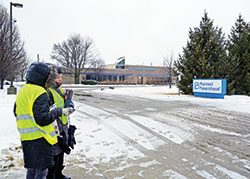Complaints filed about abortion centers open during ban

Sidewalk counselors Ann Clawson, left, and Sheryl Dye stand outside of the Indianapolis Planned Parenthood abortion facility on Feb. 20, 2019. (File photo by Natalie Hoefer)
By Natalie Hoefer
Complaints against abortion centers in Bloomington and Indianapolis have been filed with the state Attorney General’s Office in regard to those facilities remaining open and maintaining steady business during the time that Gov. Eric Holcomb ordered the temporary ceasing of elective and non-essential surgeries, including abortions, during the coronovirus crisis.
The complaints were filed by sidewalk counselors who serve outside of the Planned Parenthood (PP) abortion centers in those cities. One complaint per facility was filed for each day they were open for business in defiance of the state order.
The ban, effective from April 1-21, states that “hospitals, ambulatory surgical centers, dental facilities, plastic surgery centers, dermatology offices and abortion clinics are directed to cancel or postpone elective and non-urgent surgical or invasive procedures.”
The goal was to insure the availability of critical resources—including surgical gowns, gloves and face masks—in “combating the spread of, and treating those affected by, this dangerous [COVID-19] virus.”
“But the governor gave a huge loophole,” says Jodi Smith, state director for the Susan B. Anthony List and a lobbyist for Indiana Right to Life.
The caveat can be found in the order’s definition of elective and non-essential surgeries. It describes them as any procedure “which can be delayed without undue risk to the current or future health of the patient as determined by the patient’s treating physician … or health care provider.”
“So legally, if the doctor deemed it was an emergency or couldn’t wait, the doctor still had the right to do the surgery,” Smith explains.
“Guess what? These abortion centers never, ever thought ‘non-essential’ applied to them. They never closed a day, never listened to a word [the governor] said. Every [type of facility listed in the ban] put off doing surgeries, but the abortion doctors said, ‘We have to do it.’ ”
And they did, according to sidewalk counselors at the Bloomington and Indianapolis PP abortion centers.
“What we saw, they were open as business-as-usual,” says Monica Siefker, a sidewalk counselor at the Bloomington PP facility and a member of St. John the Apostle Parish in Bloomington. “In fact, their business went up. Our [tracking of their] March numbers saw a 20 percent increase, and the April number is even higher.”
The same circumstances were noted at the Indianapolis PP abortion facility, which “barely missed a beat in number of clients,” says sidewalk counselor Sheryl Dye, a member of St. John the Evangelist Parish in Indianapolis.
While it was not illegal for abortion centers to remain open due to the loophole in the ban, Dye and Siefker cite multiple reasons they filed complaints with the Attorney General’s Office.
Abortion facilities that maintained steady business during the ban “were in defiance in spirit with what the governor intended,” says Siefker. “There was wiggle-room, but they took advantage of that. People always say it’s a woman’s right to choose. ‘Choosing’ implies it’s elective.”
Dye notes a “concern with their using up PPE [personal protection equipment] at a time when it was very valuable.
“Plus there’s the possibilities of complications from surgical abortions, and those taking pills can end up in the ER [emergency room] if they have problems. It’s another drain on resources.”
Facilities not adhering to social distancing and other guidelines was also a source of concern.
“We know they let people in the door without masks, and we only saw one facility taking temperatures,” says Smith, a member of Bread of Life Ministries in Avon. “They really felt they were above the law.”
Dye and Siefker agree that it’s unlikely the complaints will result in any action against the facilities. But their goal in filing the complaints goes beyond seeing immediate results.
For Dye, the complaints help paint “the broader picture of what Planned Parenthood does, that [their response to the ban] was about continuing their profit lines.”
Her hope in filing the complaints is “to establish over time the different ways that they either are disregarding regulations or have violated regulations, that hopefully this becomes part of showing a pattern of their behavior.
“We’re supposed to be in this together. You can say any procedure is important—people post-chemo or getting back surgery for pain. Abortion is not an emergency procedure. It’s a choice.”
Siefker says her “biggest motive is to continue to build a case on why abortion is so bad for our country and our world. I want it to be on record what the response of the abortion industry was during the pandemic. How they justified staying open during the COVID issue brought to light all the more how they are not about women’s health, but about their own profits.”
Siefker passionately believes that “a light needs to be shined on this moral question for our country: Is [abortion] really the direction we want our community, our state, our country to go in? Is this really the direction we want to head?” †
Related story: Complaints of unlicensed abortions filed against Lafayette Planned Parenthood
